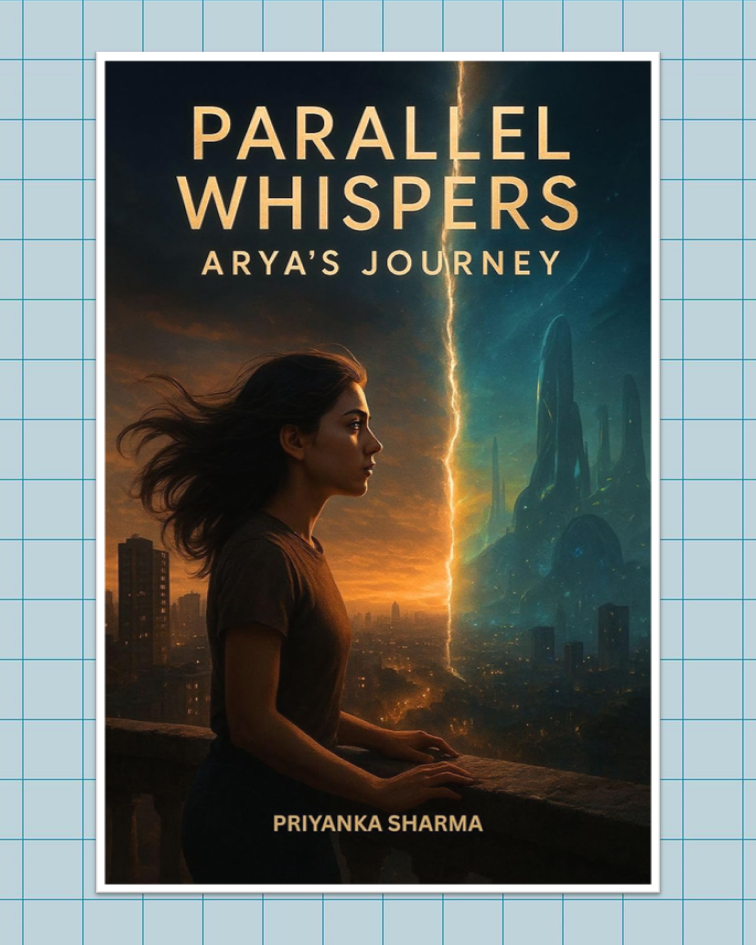Sameer Gudhate presents the Book Review of Parallel Whispers: Arya’s Journey by Priyanka Sharma
- Sameer Gudhate
- Aug 23, 2025
- 4 min read

They say books can transport you, but Parallel Whispers: Arya’s Journey by Priyanka Sharma didn’t just take me somewhere—it unsettled the ground beneath me. From the very first chapter, I felt like I was slipping into a dream that wasn’t mine, where every clue pulled me deeper and every silence felt alive. It’s rare to find a story that makes you question not just the character’s reality, but your own. This one did.
Sharma, in her debut, doesn’t just tell a story—she builds a strange, haunting mirror-world and invites you to walk right into it. Arya, her protagonist, is a reclusive software developer living in Mumbai. Ordinary on the surface, but the moment her dreams start bleeding into her waking life, ordinary slips away. Suddenly, the nights aren’t just restless—they’re riddled with strange objects that appear in her room, cryptic markings on her body, and a voice that speaks only in riddles. And then there’s that eerie reflection in the mirror—her, but not her. The setup is chilling, but it’s not just about thrills. It’s about what happens when reality bends, and identity follows.
The writing? Atmospheric in the truest sense. Sharma doesn’t waste words, but she doesn’t rush either. Her prose is textured—every line seems to carry a faint hum, like the low buzz of neon lights on a deserted street. The pacing is mostly sharp, the dream sequences melting into reality so smoothly you sometimes catch yourself questioning which side you’re on. There are moments where the tempo dips, lingering perhaps a beat too long, but then again, maybe that’s intentional. After all, dreams don’t always move in straight lines.
Arya herself is the heartbeat of the novel. She’s not some untouchable heroine; she’s deeply human—quiet, searching, sometimes doubting her own sanity. What made her stick with me wasn’t her strangeness, but her relatability. Haven’t we all, at some point, stared into the mirror and wondered if the person looking back is really us? Through Arya, Sharma captures that unsettling tug between who we are and who we might be.
Structurally, the book plays with layers. Each chapter feels like peeling back a curtain—sometimes revealing, sometimes concealing. The mystery unravels not in grand revelations but in whispers, hints, clues you want to piece together before the next dream steals them away. It’s a page-turner, yes, but not the loud kind. More like a steady pull, a quiet insistence: read one more chapter, just one more.
Beneath the surface plot, the book is really about identity and truth. What defines who we are—the waking life we know, or the hidden parts we refuse to face? Reading it, I found myself thinking about the blurred boundaries in our own lives—the online selves, the private selves, the parts we show only in dreams. At one point, I paused and thought of how often we run on autopilot, never questioning what’s real until something unsettles the pattern. Arya’s story becomes less about escaping the dream world and more about confronting the shadow truths we usually keep locked away.
The emotional impact is quiet but lasting. There wasn’t a single jump-scare moment that jolted me—it was subtler than that. It’s the kind of unease that seeps in slowly, the way a strange dream lingers in the morning, impossible to shake. There’s one scene—I won’t spoil it—where Arya comes face to face with a version of herself she doesn’t recognize, and I swear I had to close the book for a second just to breathe. It hit too close.
Sharma shines in her ability to weave mystery with emotion. The setting of Mumbai, often reduced to chaos in fiction, here feels alive with shadow and silence. The cryptic tasks Arya faces are not just plot devices—they mirror her own internal unravelling. That’s what makes the story stick. If I had to point out a flaw, I’d say a few threads felt left hanging, the kind of ambiguity that might frustrate readers who like neat closures. But in a book about blurred realities, maybe some frayed edges are part of the design.
Personally, this book scratched an itch I didn’t know I had. It reminded me a little of the unsettling dreamscapes in Haruki Murakami’s work, and the psychological depth of Gillian Flynn—though Sharma is carving her own space, for sure. I’d recommend it to readers who like their mysteries laced with atmosphere, who enjoy stories that don’t just entertain but unsettle, and who are okay with questions that don’t always have answers.
As I closed the last page, the city outside was still alive, the night stretching on. And I found myself glancing at my own reflection—half expecting it to blink first. That’s the kind of book this is. Not just read, but lived in echoes. For me? A solid 4.5 out of 5, and the kind of story that makes me curious about what Sharma will dream up next.
#ParallelWhispers #BookReview #PriyankaSharma #AryasJourney #ReadersOfIndia #IndianAuthor #BookstagramIndia #MysteryReads #PsychologicalThriller #DreamscapeFiction #ReadersOfInstagram #MindBendingReads #AtmosphericFiction #BookishWhispers #BookRecommendations #FictionWithDepth #BookLoversClub #UnputdownableReads #ReadingCommunity #BookishVibes #sameergudhate #thebookewviewman




Comments